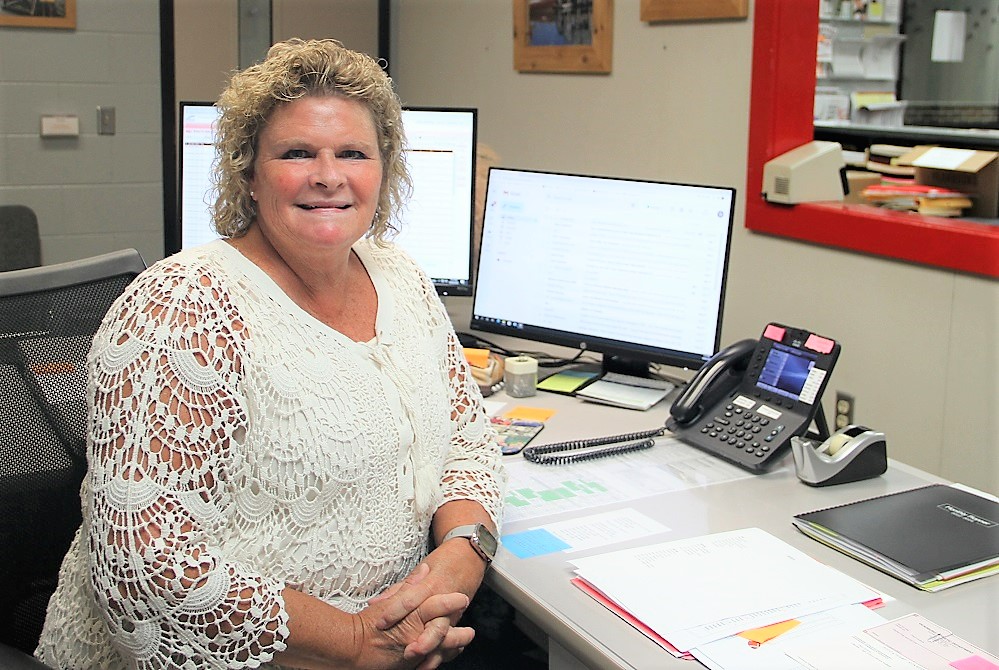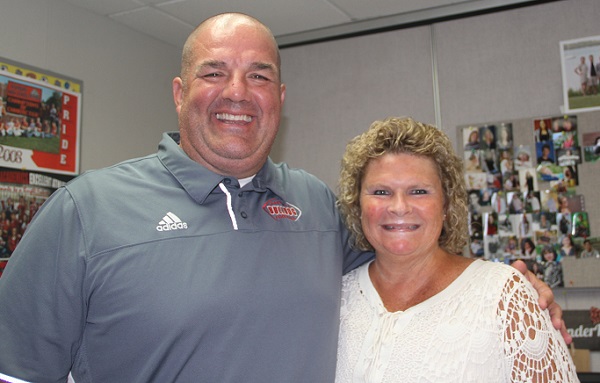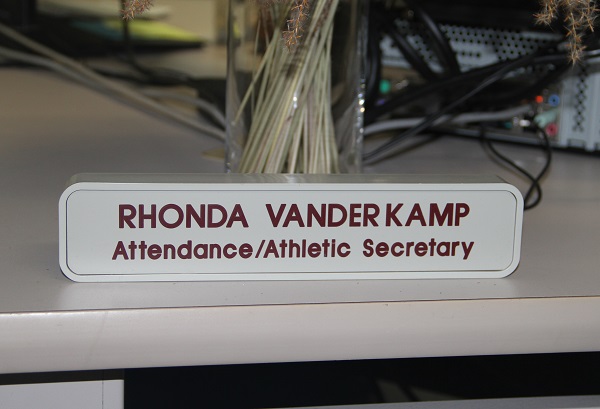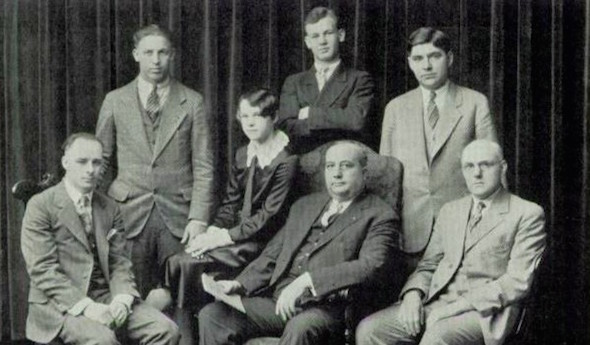
Indispensable Only Begins to Describe Vicksburg Athletics 'MVP' VanderKamp
By
Pam Shebest
Special for MHSAA.com
September 20, 2022
VICKSBURG — Reading, traveling, enjoying time with family and sitting by the pool are all on Rhonda VanderKamp’s retirement list.
 But before she embarks on that journey in June, she is finishing her 21st year as Vicksburg High School athletic secretary.
But before she embarks on that journey in June, she is finishing her 21st year as Vicksburg High School athletic secretary.
One person not looking forward to that June day is Vicksburg athletic director Mike Roy.
“I keep waking up every day coming to work, and maybe she’ll tell me I’m going to do one more (year),” Roy said.
“Like the Tampa Bay Buccaneers when Tom Brady retires, they’re going to dearly miss him. That’s the best analogy I can give; that’s how important she is to the team we have here.”
Roy should know.
The two have worked together all 21 years, forming a work family that’s become an anomaly in the world of high school athletics.
Her own family is the reason VanderKamp landed at Vicksburg.
She left her job at Heco, formerly Hatfield Electric, in Kalamazoo, after 17 years because “I wanted to be on the same schedule as what my kids were,” she said. “This allowed me to have my summers off with them and Christmas and spring breaks. It’s been just fantastic.
 “Both of them were athletes in school. My daughter was in middle school when I started. I think it was good for them to have me here when they were in high school.”
“Both of them were athletes in school. My daughter was in middle school when I started. I think it was good for them to have me here when they were in high school.”
VanderKamp and Roy were hired into the athletic department within a month of each other.
She realizes how unusual their tenure is when she attends conferences.
“They’ll ask you to stand up, introduce yourself and say what school you’re from, how many years you’ve been an athletic secretary and how many athletic directors you’ve been through,” she said.
“It’s always such pride for me to say I’ve been an athletic secretary ‘X’ amount of years and I’ve only had one athletic director. That’s just not heard of these days.”
Roy, always quick with a quip, looked back at their first year working together.
“I told her from Day One: I’m like a new husband. You train me the way you need me to be,” he laughed.
He then got serious: “She’s the MVP. There’s so much stuff that gets done in this office behind the scenes, and it’s all because of Rhonda VanderKamp.”
Roy is not the only one calling VanderKamp “MVP.”
Seven-year wrestling coach Jeff Mohney echoes that sentiment, noting that his wrestlers call her Mrs. Rhonda or Mrs. V.
“She has never told me ‘no, I don’t have time for that,’” he said. “She handles everything from contracts, referee fees, cancelations, and student-athlete eligibility. She knows every student at Vicksburg and most of their parents.
“What separates her from others is her commitment to the coaching staff and the student-athlete. She is family-driven and lets us be a part of that. She shares stories of her family and asks about ours as well.”
Mohney said one portion of their tenures together stands out in his mind.
“Her commitment to us was not more evident than when masks were required at school,” he said. “We didn’t see her face for over a year. She was trying to keep her families safe to the best of her ability.
 “Now the highlight of my day is seeing Mrs. Rhonda’s smile. Vicksburg wrestling would not be relevant without Mrs. Rhonda’s commitment to us.”
“Now the highlight of my day is seeing Mrs. Rhonda’s smile. Vicksburg wrestling would not be relevant without Mrs. Rhonda’s commitment to us.”
One of VanderKamp’s proudest achievements during her 21 years was the addition of 10 varsity sports: hockey, equestrian plus boys and girls clay target, bowling, lacrosse and skiing.
In addition to her athletic secretary duties, she is also in charge of coordinating attendance and discipline.
“All the sick kids, the late kids, the kids who need to leave early all come through my office,” she said.
“Discipline also comes through my office, although I have help with that now.”
Her typical day begins about 7 a.m., and she is usually greeted by the ringing of phones.
“The kids are coming in with notes they have to get out early, parents are calling for sick children, I’m listening to (phone) messages,” she said.
“Once school starts, it’s constant activity. I always make sure I confirm my refs scheduled for that day, make sure my rosters are ready to go.
“Mike always double checks transportation. It’s a cycle. You just know what needs to be done, and you go with it.”
She said the job has also become a lot busier with the additional sports including “entering every athlete into the athletic software, making sure they’re all getting their awards, keeping on top of coaches when they add athletes, submitting pictures once I receive them onto our website and to boosters so we can print a booklet for each season.”
Time to travel abroad
The travel part of her retirement will include a trip to the Netherlands to visit Suzan Hauwert, who lived with the VanderKamps during the 2001 school year, and to Germany to visit Annika Busch, who lived with the family in 2003. Both were exchange students.
In addition, “My husband spoke Dutch before he spoke English, so his parents came right over on the boat,” the soft-spoken VanderKamp said.
Her husband, Gerrit, was in the U.S. Army and stationed in Germany, so they also plan to visit some of his old bases.
While VanderKamp has never visited Europe, both exchange “daughters” have been back to Vicksburg several times to visit.
 “Both were in my daughter’s wedding five years ago,” she said. “They’ll join us on vacations or come to visit. It’s such an intense bond we share with them.”
“Both were in my daughter’s wedding five years ago,” she said. “They’ll join us on vacations or come to visit. It’s such an intense bond we share with them.”
She also is looking forward to spending more time with 2-year-old granddaughter Presley, who lives in Portage with parents Andrea (VanderKamp) and Michael Prior.
Son Robert, and his wife, Shelby, live in Kalamazoo.
While she expects to leave her job in June, she said she does not need a lot of praise or attention – but deservingly is receiving it.
One of those praising her is Vicksburg’s 16-year volleyball coach Katrina Miller.
“Rhonda is a miracle worker” Miller said. “I swear she can do it all!
“As far as impacting my sport, it’s always nice for me to know that things are in order with my team and their paperwork and information.
“I have emailed her at odd hours looking for copies of physical forms or eligibility for tryouts and she is always right on it. She is going to be very missed, but we are happy that she will be able to have some time with herself and with her family.”
While her daily job may be over in June, VanderKamp and the Bulldogs will see each other again.
“I love the kids, I love my co-workers,” VanderKamp said. “I plan to sub if they need me in the office, so it’s not really goodbye. It’s ‘See you around.’”
 Pam Shebest served as a sportswriter at the Kalamazoo Gazette from 1985-2009 after 11 years part-time with the Gazette while teaching French and English at White Pigeon High School. She can be reached at [email protected] with story ideas for Calhoun, Kalamazoo and Van Buren counties.
Pam Shebest served as a sportswriter at the Kalamazoo Gazette from 1985-2009 after 11 years part-time with the Gazette while teaching French and English at White Pigeon High School. She can be reached at [email protected] with story ideas for Calhoun, Kalamazoo and Van Buren counties.
PHOTOS (Top) Rhonda VanderKamp sits at her desk as she begins her 21st year in the Vicksburg athletic department. (2) VanderKamp has worked all 21 years alongside athletic director Michael Roy. (3) The VanderKamp family, from left: son Robert VanderKamp, daughter-in-law Shelby VanderKamp, son-in-law Michael Prior, granddaughter Presley Prior, daughter Andrea Prior, Rhonda VanderKamp, husband Gerrit VanderKamp and father Bob Rainwater. (4) Rhonda VanderKamp has welcomed thousands of students during her time as athletic and attendance secretary. (Top two and bottom photos by Pam Shebest; family photo courtesy of Rhonda VanderKamp.)

50 Years Later, 'Charlie' Remains Legendary
By
Ron Pesch
MHSAA historian
September 30, 2018
There is no official record of the proceedings, only a short newspaper recap of the event that was hosted 50 years ago at Michigan State’s Kellogg Center. In attendance was a who’s who of high school sports administrators. They were there to honor the man, affectionately known to his friends as “Charlie.”
A parade of guests presented gifts and citations, then sang his praises.
Dr. Clifford Fagan, Executive Secretary of the National Federation of High School Athletics, attended. State Directors of Athletics from Indiana and Ohio were on hand for the Monday, October 7, 1968, celebration.
Dr. Ira Polly, State Superintendent of Public Instruction, called him “noble, honest and courageous.” John F. Toepp, a state senator and radio sports broadcaster from the Cadillac area, “hailed him as ‘Mr. High School Athletics.’”
Sportswriter Bob Gross, six years into his career at the Lansing State Journal, wrote that Charles E. Forsythe, seated next to his wife Josephine, “only grinned with each word of gratitude.”
More than 350 friends attended the testimonial dinner, honoring the second director of the Michigan High School Athletic Association upon his retirement. For 39 years, Forsythe had served the MHSAA, dedicated to bettering the world of high school sports in Michigan and beyond. His years of service would formulate the mold for those who would follow in his footsteps.
“For five minutes they applauded,” wrote Gross, capturing the moment. Forsythe was humbled by the appreciation. When it was his turn to speak, he thanked the assembled crowd.
 “This is a great night. It’s just wonderful so many of you came to my party. I’m deeply honored,” Forsythe said. “I can’t stand here and accept all the thanks. It was teamwork that made our organization go. And, may I ask of all of you to please help make it grow bigger and better than it is.”
“This is a great night. It’s just wonderful so many of you came to my party. I’m deeply honored,” Forsythe said. “I can’t stand here and accept all the thanks. It was teamwork that made our organization go. And, may I ask of all of you to please help make it grow bigger and better than it is.”
The MHSAA had announced Forsythe’s retirement in late May.
With the exception of a 39-month tour as a Navy Commander, assisting former heavyweight boxing champion Gene Tunney in directing Navy physical fitness activities during World War II, Forsythe had been with the Association since July of 1929, originally as an assistant to Alden W. Thompson, the first director of the MHSAA. (Forsythe remains considered the Association’s first fulltime executive director.)
A graduate and prominent athlete at Milan High School, Forsythe earned his undergraduate degree from Michigan State Normal College (today’s Eastern Michigan University) in 1920 and his Master of Arts degree from the University of Michigan in 1926. He coached basketball and baseball at Milan High School during 1922-23 and taught science. He moved to Lansing Central High School the following year, where he taught history. In the fall of 1926, Forsythe was named director of athletics. According to news reports, he was also “one (of) the leading high school football and basketball officials in the state, working in the district and regional basketball tournaments …”
In his introduction of Forsythe as his new assistant, Thompson said “his presence in this office will make it possible to extend the service rendered by the State Association for the ultimate good of the athletic program throughout the state. The growth of the basketball tournaments, the addition of regional track meets as well as tournaments in tennis and golf, and state association participation in swimming and cross country have all added to the details of business handled through the office of the state director …”
In his book, “Athletics in Michigan High Schools: The First Hundred Years” published in 1950, Lewis L. Forsythe noted that additional help definitely was needed. The elder Forsythe, who was Charles’ uncle, was principal of Ann Arbor High School from 1917 until his retirement in 1946. He twice had served as president of the Michigan Interscholastic Athletic Association, the predecessor to the MHSAA. Elected president of the MHSAA Representative Council in 1924, Lewis Forsythe continued serving in that role until 1942. He had seen, first-hand, Thompson’s need for help.
 “Ever since the new association was organized, it had been the wonder of every informed person that Mr. Thompson could stand up under the strain of the work he felt compelled (or impelled) to do. We knew the strain was terrible and unwise,” Lewis Forsythe wrote.
“Ever since the new association was organized, it had been the wonder of every informed person that Mr. Thompson could stand up under the strain of the work he felt compelled (or impelled) to do. We knew the strain was terrible and unwise,” Lewis Forsythe wrote.
“(Charles’) appointment not only relieved Mr. Thompson of a great deal of detail, but enabled the association to enlarge and improve its services to the schools.”
As assistant director, Charlie traveled Michigan, supervising state officials and conducting MHSAA tournaments. While he was in the office, he improved Association communication with member schools by preparing and expanding the State Association Bulletin. When Thompson was appointed to State Director of Health and Physical Education in Michigan in 1931, it opened the door for Forsythe to become director of the MHSAA.
“Thompson had the job of building the Michigan High School Athletic Association ‘from scratch’ and he built very well,” said Charles several years later. “He was thorough in his application of rules and in seeing that they all were interpreted alike both to large and small schools, so no favoritism or any difference were shown.” If there has been any success in the (years I) served, much of it can be credited to the background and good training I received during the period that I served under Thompson …”
In 1939, Forsythe released the first of four editions of his book, “The Administration of High School Athletics.” It quickly found a home as a textbook at various colleges and universities around the country. For 19 summers, he travelled as a visiting lecturer or staff member of the Universities of Michigan, Wisconsin, Ohio State, Southern California, West Virginia, Indiana, Oregon and elsewhere.
In 1941, George Maskin of the Detroit Times wrote about Charlie’s impact after 12 years in the position.
“This Forsythe fellow is a short, stocky gent of 41. There’s a touch of gray circling around the edge of his head, probably caused by the nights he’s stayed awake worrying whether one of his new ventures would turn out successfully,” Maskin wrote.
“There have been some mighty changes, as well as improvements, since Forsythe was hired to boss the preps. But when he talks, Forsythe speaks in terms of ‘we.’ There’s nothing egotistical about Forsythe’s way of doing things. “
Maskin noted some of the achievements that had occurred under the Forsythe regime. During those dozen years, the number of schools competing in Michigan prep sports jumped from 600 to 750. Six-man football had spread to 100 of Michigan’s smaller schools, which formerly passed over the fall sport. Under Forsythe’s leadership, local and regional tournaments in basketball play increased, “thus reducing the amount of traveling and time lost from school during the state championships.” A team competing in state tournament basketball games would play no more than one game per day – against two in other states adjoining Michigan. Minor sports – tennis, golf, cross country, swimming – had come into their own. Forsythe recognized their value in drawing additional students into athletics and increasing athletic participation. He would take that knowledge with him when he entered the Navy (and would return from the service with an even broader view of their value).
 Yet, perhaps his greatest achievement was his emphasis on safety in sports.
Yet, perhaps his greatest achievement was his emphasis on safety in sports.
In 1937, at the 13th annual MHSAA football rules meeting, “leaders drafted a program to address and demonstrate “techniques intended to make football a safer game for high school boys.” A mandatory rule to require “a three minute warm-up on the practice field before the start of the second half of each game” was put in place. The association had recognized that more serious injuries in football occurred at the start of the second half, because players had rested between periods and weren’t stretching out before resuming play. The creation of an accident benefit plan administered by the MHSAA for the state’s athletes had been discussed for six years, but had failed to engage because of a lack of participation. In December of 1939, it was finally ratified. The plan went into effect with the 1940-41 school year and required schools participating in the program to report all injuries. That led to more accurate data, and, in turn, an increased focus on safety and attention to equipment.
“There has been a decided improvement in the type of equipment worn, especially in football” said Forsythe to Maskin in 1954. “Rules have been written much more with the idea of protecting participants than formerly used to be the case.”
In 1961, Forsythe noted that face guards helped reduce the number of eye injuries and fractured noses. In the fall of 1962 a compulsory mouth guard rule went into effect in football, resulting in a 58-percent reduction in claims filed against the plan for dental injuries.
But at the time of his retirement, it was still apparent that the state basketball tournament was Forsythe’s pride and joy, and the event that allowed the MHSAA to function financially. Attendance at all District, Regional and Final games in 1930 was 126,000. At the time of his retirement in 1968, postseason attendance topped 775,000.
“I remember the time when we used to have to advertise to try to get people to come to our Finals,” said Forsythe to an Associated Press reporter shortly before his final day. “Now they all are automatic sellouts before the games are played,”
Tighter regulation reduced the use of illegal players, as seen in the earliest years of the tournament.
“Some of the coaches used to go out recruiting,” continued Forsythe. “… In the old days, we were more of a police agency. The coaches would try anything they thought they could get by with. Now they generally ask us first or turn themselves in if they discover they are playing a boy who is ineligible.”
“At 69, he still looks fit enough to play running instead of standing guard in any basketball game. He credits this mostly to a strict diet and sensible exercise, such as working in his garden. Forsythe also plans some traveling. “I might take in next year’s basketball finals,” he added with a grin, “If I can get a ticket.”
But a return trip to Michigan State University’s Jenison Field House, home to the MHSAA Basketball Finals since 1940, wasn’t in the cards. The September 1968 issue of the MHSAA Bulletin featured Forsythe on the cover, celebrating his career. In December, he passed away unexpectedly at his Lansing home. The February 1969 Bulletin presented a memoriam, praising his service and “his keen appraisal of athletics, their place in our society and their administration.”
With the August retirement of John E. “Jack” Roberts after 32 years of service, and the appointment of Mark Uyl as executive director, there have been only seven executive directors since the MHSAA was formed in 1924. Beside Thompson and Forsythe, Julian Smith handled the organization between 1943 and 1944 during Forsythe’s military service. Allen W. Bush (1968-78), who served as an MHSAA assistant for eight years to Forsythe, was followed by Vern Norris (1978-86).
 Ron Pesch has taken an active role in researching the history of MHSAA events since 1985 and began writing for MHSAA Finals programs in 1986, adding additional features and "flashbacks" in 1992. He inherited the title of MHSAA historian from the late Dick Kishpaugh following the 1993-94 school year, and resides in Muskegon. Contact him at [email protected] with ideas for historical articles.
Ron Pesch has taken an active role in researching the history of MHSAA events since 1985 and began writing for MHSAA Finals programs in 1986, adding additional features and "flashbacks" in 1992. He inherited the title of MHSAA historian from the late Dick Kishpaugh following the 1993-94 school year, and resides in Muskegon. Contact him at [email protected] with ideas for historical articles.
PHOTOS: (Top) Charlie Forsythe, standing far right, served at Lansing Central at the time of this photo in 1927. (Top middle) Forsythe in 1938. (Middle) MHSAA Executive Director Alden Thompson. (Below) Forsythe. (Photos gathered by Ron Pesch.)

